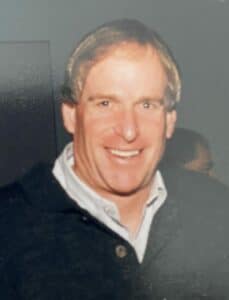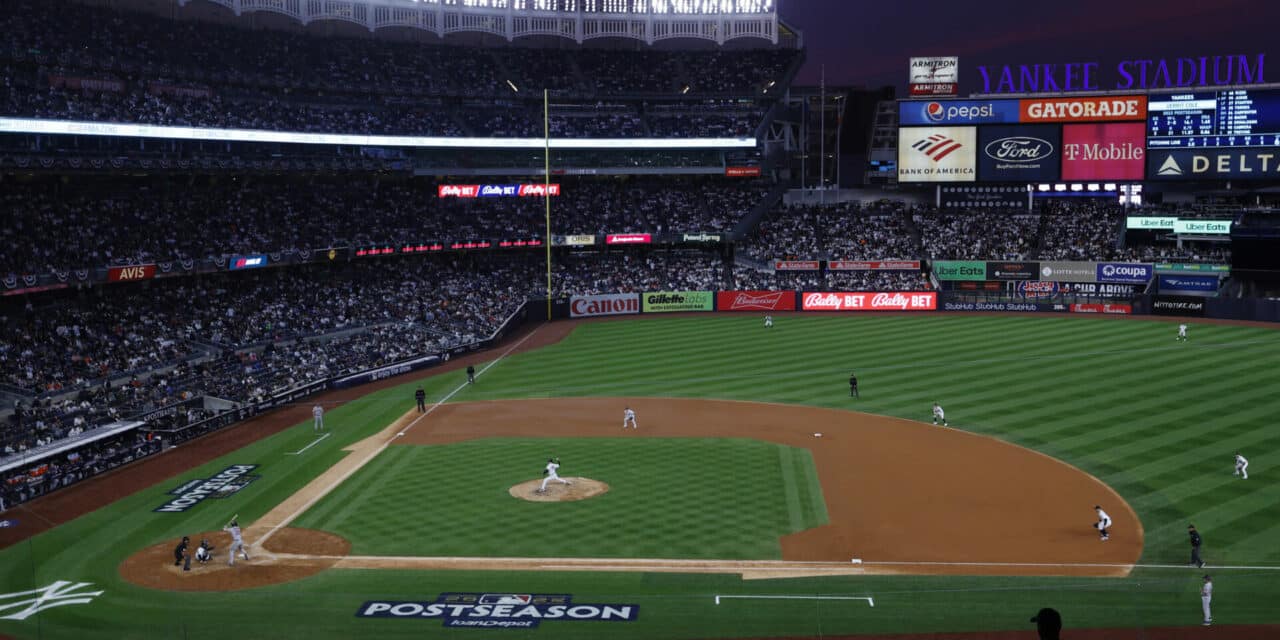LEGENDARY ROLE: Sports concessionaire Larry Hatch helped launch Legends Hospitality, the food and retail provider at new Yankee Stadium, shown here during the 2022 American League playoffs. (Getty Images)
Colleagues: Hatch was demanding, loyal, supportive
Larry Hatch, a spirited sports concessions executive who turned the old Volume Services into a leading food provider at NFL stadiums and who was on the ground floor for launching Legends, a cutting-edge partnership between the New York Yankees and Dallas Cowboys tied to their new stadiums, died Tuesday of a heart attack. He was 69.
Over a career spanning 40-plus years, Hatch served as CEO of Volume Services, which later became Centerplate and is now part of Sodexo Live! He also spent a short term as CEO of Fine Host, another sports concessions firm. In the early 2000s, after retiring from Centerplate, Hatch was among the principals forming the joint venture to create Legends Hospitality, which now stands among the leading food vendors in the big leagues and college sports.
At the time, Hatch had a strong relationship with the Yankees, a longtime Volume Services account, and he helped bring them together with the Cowboys to form a new concessions firm as they developed their new billion-dollar venues that opened in 2009. Shortly after getting the new company started, Hatch left Legends to pursue other opportunities.
His colleagues remember Hatch as a high energy and demanding boss, but loyal and supportive of his employees, willing to do anything to help them advance in the industry.
Sean Henry, president of the Nashville Predators, and Dan Smith, president of Legends Hospitality and employee No. 1 for that company before it opened for business in 2008, were among those that worked under Hatch’s tutelage at Volume Services. At that firm, Hatch forged deals with, among others, NFL expansion teams the Carolina Panthers and Jacksonville Jaguars, plus the Tennessee Titans after they relocated from Houston to Nashville, and new Jack Kent Cooke Stadium in Washington, D.C., now FedEx Field.
At one time, Volume Services held about a dozen NFL stadium accounts. Hatch helped transform a sleepy industry into what it is today, through his financial acumen, according to Smith, who spent 25 years with Volume/Centerplate, starting as a vendor at old Yankee Stadium. As the NFL expanded in the ’90s, the Panthers and Jaguars went with Volume Services because the firm had the reputation of knowing to how to feed a mass of people and do it quickly and efficiently, Smith said.

Larry Hatch
“When you look back, there are few people you point to who became icons in this industry, and Larry was definitely one of them,” he said. “His vision in the late ’70s was to transform the industry and he lived through a lot of that. Back in the day, he was instrumental with Volume getting a foothold in the NFL and growing that platform. It was right at the proliferation when all the new venues were coming online. His vision was to deploy capital in a way where you could help elevate the fan experience.”
Henry was a skinny teenager working at Jones Beach amphitheater in New York, a Volume Services account, when he first met Hatch, who helped him carry bags of trash to the garbage bin. If it wasn’t for Hatch and his guidance, Henry said he may not have finished college. Hatch promised Henry a full-time job after graduation, a promise he held intact. Henry worked several years in the concessions space before switching to the team side.
“The guy gave me a career and built a training program for me,” Henry said. “He promoted me more times than I was ever ready. He was also a good soundboard, encouraging and supporting. He took an industry that was overlooked and told us we have to play an integral role in it, whether it was a game or a concert. You were drawn to him; you wanted to be around this guy.”
Jon Muscalo spent more than 30 years in concessions with Volume Services/Centerplate and Legends, specializing in the design of food and beverage destinations. Muscalo worked with Hatch for 15 years. Together, those two, along with Dan Smith and Jim Shepard, essentially started Legends, first consulting for the Yankees before pursuing a partnership with the Cowboys. Muscalo became Legends’ vice president of facilities for about a decade before retiring about five years ago. Shepard, a concessions veteran and consultant, went on to serve as Legends’ initial chief financial officer.
Together, Volume Services laid their foundation. Over the years, the company won a lot of big accounts, Muscalo said, including the San Francisco Giants at the time they played at old Candlestick Park. The year was 1993 and Volume had a slim 43 days until Opening Day to upgrade the stadium’s concessions operation. They did it under a tight deadline, renovating every stand and building four new stands, adding 40 new points of sale, he said.
“Larry drove us hard and we got it done,” Muscalo said. “We called it ‘a Fix to the Stick.’ We went on to win their new ballpark. Tampa Bay (Rays) was another one where we were under the gun to get it ready to open and we made it. The building had one functioning concession stand. The Lightning played their home games there and had brought in trailers and trucks. We basically started from scratch with that stadium.”
Bill Greathouse, a vice president with Bon Appetit, the concessionaire at Oracle Park in San Francisco, where the Giants now play, started at Candlestick after relocating from Omaha, Nebraska, where he worked at old Rosenblatt Stadium. Greathouse, considered to be among the best food service operators in sports, started with Volume in the late 1970s at the convention center in Austin, Texas.
“The thing about Larry was leadership and loyalty,” Greathouse said. “When I look back at my career, I would not have achieved what I did without Larry. He took a chance on me from Omaha to come and run the San Francisco operation, which was pretty amazing. I hope I measured up to what he hoped for. The guy was so big in everybody’s lives and in this business.”
Jerry Grefer, general manager at Sodexo Live! for Texas Christian University’s sports venues, echoed those sentiments. For 20 years, Hatch served as Grefer’s mentor, starting with Riverfront Coliseum in Cincinnati, how Heritage Bank Center.
“Larry worked it 24 hours a day,” Grefer said. “I always tell people Larry had two names for me: Jerry and ‘Godammit’ Jerry. But he cared about us, the people who worked with him. It wasn’t just him keeping all the money; we all had the opportunity to share in that and I was grateful for that. I didn’t know anything about finances and IPOs and things like that. He put us all into that.”
Chris Bigelow, a food consultant, worked with Hatch for a number of years and at one point served as his boss at Volume Services. Bigelow was a regional vice president and Hatch ran the food at Barton Coliseum, part of the Arkansas State Fairgrounds in Little Rock. Bigelow witnessed Hatch progress up the ranks of the company to a VP role in Kansas City before getting promoted to president.
“When I saw him in Little Rock, I thought, this guy is sharp, he needs to be promoted,” Bigelow said.
Hatch was a conscientious person, which helped him become a successful concessions executive, said Ken Young, another former colleague with Volume Services who went on to run his own food service firms. Early in their careers, Hatch reported to Young. Their first dealings with each other came when Hatch ran the food at the Los Angeles Memorial Coliseum. Hatch did a great job there and his career soon took off, Young said. Years later, they became friendly competitors in the business.
“Larry was a funny guy,” Young said. “From a very young age, he had a major hearing problem. He wore a hearing aid, but he still didn’t hear very well. You would be sitting across the table from Larry and would have no idea if he heard what you said. When I heard the news (of his death), I started thinking about those days. I wasn’t sure if he ever understood what was going on or not.”
In the end, Hatch heard things loud and clear, and he understood what it meant for two iconic brands such as the Yankees and Cowboys to develop a strategic alliance. The partnership paid off immensely. Over the past 15 years, Legends has expanded its business to include running merchandise, facility development. selling sponsorships and premium seats and developing technology.
Two years ago, Sixth Street, a private equity firm, acquired a controlling interest in Legends as the company grew in value to $1.35 billion.
“I thought he was crazy,” Henry said. “Larry can’t get Jerry Jones and George Steinbrenner together in the same room and produce this company. But what he built was amazing.”







